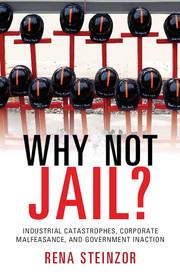Chapter 2 - White Collar Crime Today
Published online by Cambridge University Press: 05 December 2014
Summary
Thus criminal justice tells us where the moral boundaries are, where the line lies between good and bad. It patrols those boundary lines, day and night, rain or shine. It shows the rules directly, dramatically, visually through asserting and enforcing them. (There are lessons from non-enforcement, too: from situations where the boundaries are indistinct, or the patrol corrupt or asleep; and society is quick to learn these lessons, too.)
Lawrence M. Friedman, Crime and Punishment in American HistoryWhite Collar Neglect
American law provides federal and state prosecutors with powerful authority to charge individuals and corporations with crimes and to win, but they rarely pursue such cases. This paradox is especially poignant with respect to criminality that kills or injures workers or consumers, or that causes irretrievable damage to natural resources. Prosecutors have largely turned a blind eye to such violations, depending instead on a broken regulatory system to deter illegal behavior. To be sure, some of the criminal statutes that apply to health and safety offenses treat them lightly: purveyors of tainted food or grossly negligent employers face misdemeanor charges providing for prison terms of a year or less. Rather than working to develop cases that overcome these weaknesses by, for example, charging multiple violations that add up to significant jail time, prosecutors have largely abandoned those fields.
One conundrum running throughout the field of neglected criminal enforcement is whether to charge corporations or their employees. The decision is admittedly complex, but forgoing enforcement altogether should not be a third and favored option. As a matter of principle, corporations should be subject to prosecution when the violations were endemic to the corporate structure, as opposed to the brainchild of isolated, rogue employees. Individuals can and should be charged alongside their corporate employers, providing a different kind of deterrent to future malfeasance.
- Type
- Chapter
- Information
- Why Not Jail?Industrial Catastrophes, Corporate Malfeasance, and Government Inaction, pp. 40 - 65Publisher: Cambridge University PressPrint publication year: 2014



